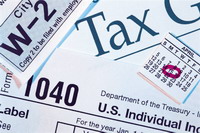Homeowners can now renegotiate their mortgages to avoid foreclosure
American homeowners to avoid foreclosure will not get stuck with a tax bill under legislation approved Wednesday by the House's taxwriting panel.

Debt that is forgiven now is treated as income and subject to tax. The legislation is a response to the subprime lending crisis and a move by homeowners to renegotiate their mortgages to avoid foreclosure.
The House Ways and Means Committee approved the bill by voice vote, though some Republicans objected to a provision in the bill that would tighten the tax code's treatment of second homes that are converted to principal residences. The bill now will be presented to the full House for a vote.
The proposed legislation also extends through Dec. 31, 2014, the income tax deduction for private mortgage insurance. A temporary version of the deduction is set to expire Dec. 31, 2007.
The bill is backed by the National Association of Home Builders, the Mortgage Bankers Association, and the National Association of Realtors.
Michael Desmond, tax counsel for the U.S. Treasury Department, said that while the Bush administration differed with the bill on several fronts it supported the committee's vote.
As part of his response to the subprime home-lending crisis, President George W. Bush proposed shielding homeowners from the debt-forgiveness tax for three years. The committee bill would make that change permanent.
Bush provided no revenue offset for the proposal, which would save homeowners $650 million (460 million EUR) over the next three years.
Congressional Democrats, however, reinstated deficit reduction rules when they took the majority in January and chose to tighten the tax treatment of second homes to offset the cost of the debt-forgiveness proposal. The change will raise roughly $180 million (127.5 million EUR) over three years, but tax receipts from the change would rise to $400 million (283 million EUR) a year by 2017.
About one in 20 households in the U.S. own a second home, according to the Census Bureau.
Subscribe to Pravda.Ru Telegram channel, Facebook, RSS!





